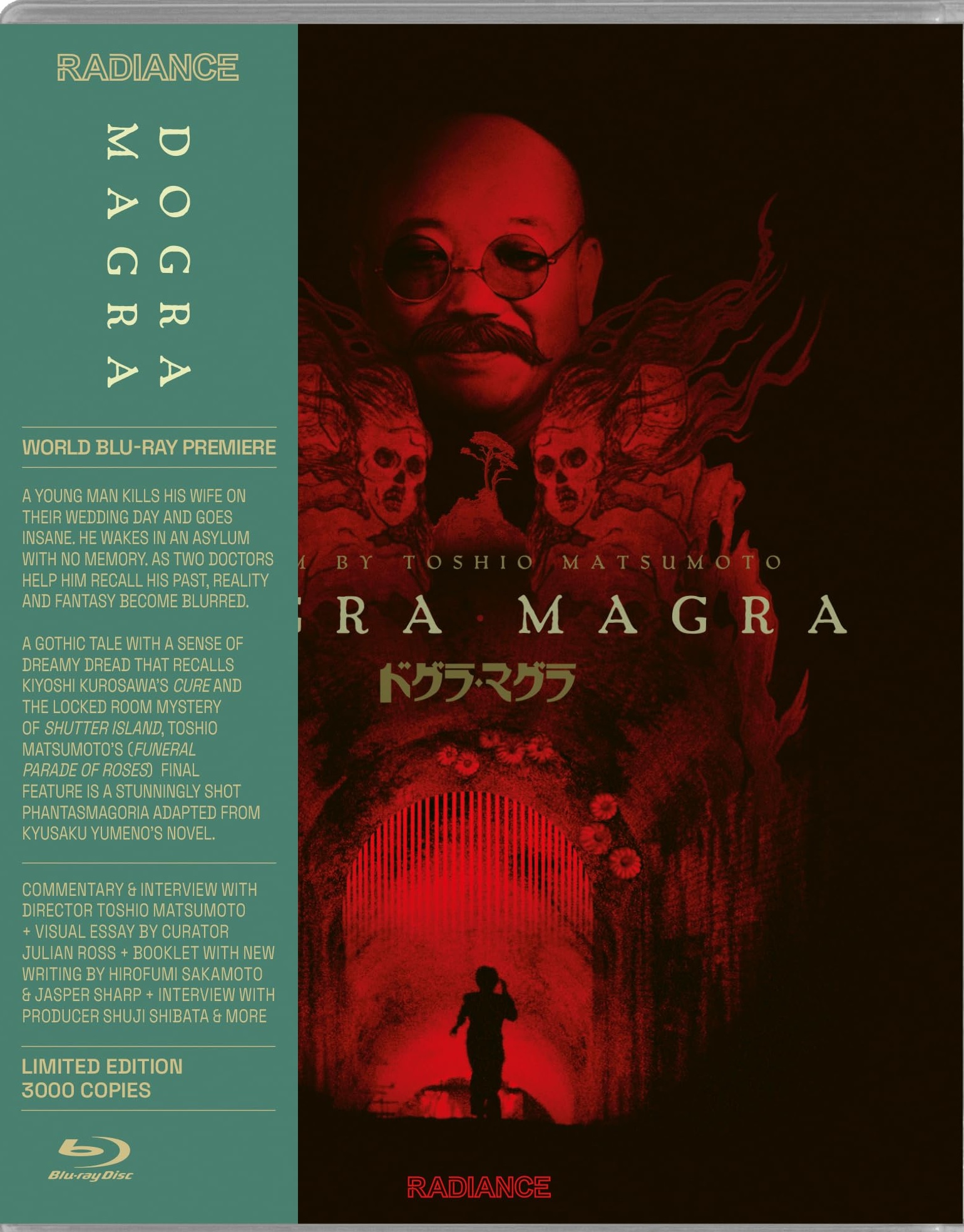A man named Kure Ichiro (Yôji Matsuda) wakes up to find himself in a mental institution with no memory of who he is or why he is there. He is told by a Dr. Wakabayashi (Hideo Murota) that Ichiro has killed his fiancée on their wedding day, and his amnesia is caused by his brain’s attempts to block out the past. Dr. Wakabayashi also discusses another doctor, Dr. Masaki (Shijaku Katsura), who died recently but has theorized about ancestral transgressions inherited through memory and how that may apply to Ichiro. But suddenly Dr Wakabayashi disappears and Dr. Masaki pops up from under a desk, explaining that he has been hiding and that Dr. Wakabayashi has sinister machinations at play. As the line between reality and fantasy blurs, Ichiro must sort out fact vs. fiction and determine what really happened in his past and how he can reclaim his lost mind.
Dogra Magra is an extremely difficult film to parse out what is happening from scene to scene. Director Toshio Matsumoto, who has made a career out of defying expectations with experimental short films and challenging narrative features like Funeral Parade of Roses and Shura, takes what is by all accounts an unfilmable source novel and sends it swirling into a cyclical mind fuck of unsettling hallucinations, strange visuals and a willfully fragmentary narrative that offers no easy answers as to what is happening. Yet despite the feeling that I have been cast adrift in an endless sea of turmoil, I found Dogra Magra to be an endlessly fascinating experience unlike just about any film I’ve come across (the reality-melting films of David Lynch probably come closest in tone to much of this movie). Matsumoto traps the viewer in a surreal labyrinth where Ichiro is treated as a surrogate for us, being driven forward despite having no sense of direction and no grounding in what is real. By the end as the film grows increasingly psychedelic and fractured, we pray for some kind of release, some kind of acknowledgement that the journey has meant something. But at the end of the day, it doesn’t really matter. We are back where we started, and the journey is all we have.
Radiance has brought Dogra Magra to blu-ray in a very nice new high definition digital transfer provided by producer Shuji Shibata, capturing the more naturalistic tones of the early parts of the film equally as well as the more extravagant, color-saturated fantasias of the latter sections. This is a transfer that does Matsumoto’s wildly original vision justice. The audio is provided in a Japanese mono track that sounds clean and clear of any noticeable distortion or distracting hiss. Overall, the technical presentation here is top notch. One major extra included is an audio commentary with director Toshio Matusmoto, and he is quite verbose as to the reasoning behind why he felt compelled to tackle such a daunting work as well as the themes and meaning behind certain scenes and the overall film and how they relate to the source novel. It’s a great track well worth checking out if you are a fan. We also get an interview with Matsumoto where he focuses on his reasoning for what led to adapting such a challenging novel and how he approached it. Programmer and Curator Julian Ross provides a visual essay on Matsumoto’s career, particularly focusing on Funeral Parade of Roses and Dogra Magra. Finally we also get a curious extra that has Matusmoto taking actor Shijaku Katsura to visit a street performer to learn how to do the chant that he would need to recite in the film. To round things out, the disc includes a trailer a photo gallery of production sketches and a physical booklet that includes an essay by professor on experimental film Hirofumi Sakamoto (translated by Tom Mes), a director’s statement on the film by Matsumoto, an essay on screenwriter Atsushi Yamatoya by author, scholar, filmmaker Jasper Sharp and an interview with producer Shuji Shibata. It’s an even more robust physical booklet than usual and is full of all kinds of interesting information about the film and the people involved in the making of it.
Dogra Magra is a challenging, visually and thematically rich puzzle box of a film that deserves to be seen by a much wider audience, and Radiance has given it a top tier presentation and suite of extras that serves the film very well. Highly recommended!

